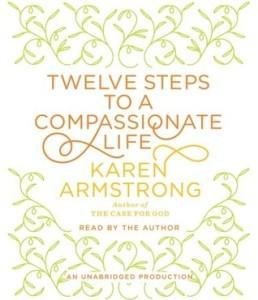 A process for developing personal compassion to engage in compassionate community for a more compassionate world
A process for developing personal compassion to engage in compassionate community for a more compassionate worldWelcome to Compassionate Sunday. We’re working through Twelve Steps to a Compassionate Life by Karen Armstrong, one step per month.
If you live in the St. Louis area, an in-person study group started working with this book and will continue for the next few months. Let me know if you’d like to join us and I’ll you hook you up!
If you’d like to share a post about what you learned about compassion (The First Step) or what you’re seeing in your world (The Second Step), self-compassion (The Third Step), or empathy (The Fourth Step) use the link list below. Or join the discussion in the comments or on Facebook.
Today begins a new month and a new step, The Fourth Step, Empathy. For much of this chapter, Karen Armstrong retells the stories of the Greek plays, stories meant to lead Athenians to a place of more compassion for themselves and each other.
For modern-day citizens of the world, Armstrong advocates watching movies:
Films are especially emotive, because the big screen brings us even closer to the characters. We can find ourselves moved to tears, our mirror neurons firing as we witness the pain of characters in a movie, even though our rational minds tell us that their suffering is entirely fictional. (p. 98)
She notes, as I’m sure most book bloggers would, that reading novels can have the same effect.
Imagination is crucial to the compassionate life. A uniquely human quality, it enables the artist to create entirely new worlds and give a strong semblance of reality to events that never happened and people who never existed. Compassion and the abandonment of ego are both essential to art: it is easy to spot a poem, a novel, or a film that is self-indulgent or brittle with cruel cleverness. When a film makes us weep, it is often because it has touched a buried memory or unacknowledged yearning of our own. Art calls us to recognize our pain and aspirations and to open our minds to others. Art helps us–as it helped the Greeks–to realize that we are not alone; every body else is suffering too. (p. 98)
Books and movies energized my compassion from a young age. The Boxcar Children (Gertrude Chandler Warner) formed my image of the homeless, Going on Sixteen (Betty Cavanna) gave me sympathy for new kids who moved into our small town, and Little Women (Louisa May Alcott) prepared me for the grief of losing loved ones to death.
As an adult, this sort of education by story continues. Sharon Bolton’s books in the Lacey Flint series increased my understanding of immigrant issues. Between the World and Me, the memoir by Ta-Nehisi Coates, deepened my understanding of the issues underlying #BlackLivesMatter. Havana Nocturne (another nonfiction selection but told like a story) by T.J. English showed me how Cubans could be open to Communism as a solution after experiencing government run by the American Mob. And, that’s just from the last few months!
How have stories — plays, books, films — impacted your capability for empathy?
